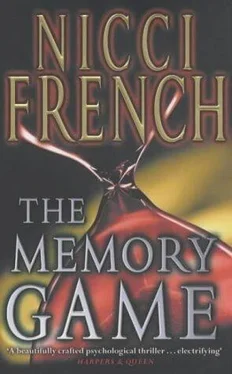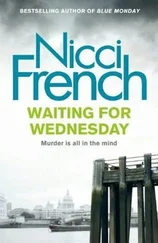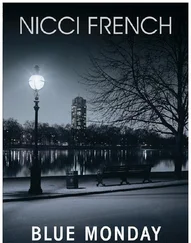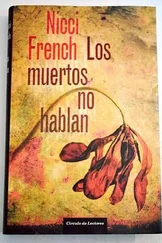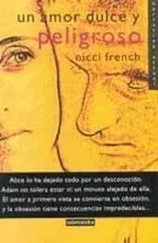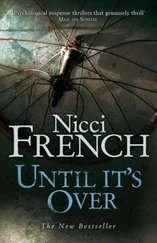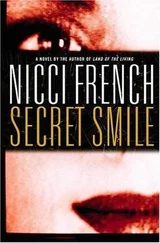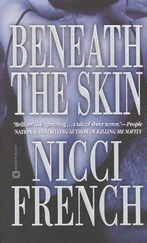Nicci French - The Memory Game
Здесь есть возможность читать онлайн «Nicci French - The Memory Game» весь текст электронной книги совершенно бесплатно (целиком полную версию без сокращений). В некоторых случаях можно слушать аудио, скачать через торрент в формате fb2 и присутствует краткое содержание. Жанр: Триллер, на английском языке. Описание произведения, (предисловие) а так же отзывы посетителей доступны на портале библиотеки ЛибКат.
- Название:The Memory Game
- Автор:
- Жанр:
- Год:неизвестен
- ISBN:нет данных
- Рейтинг книги:4 / 5. Голосов: 1
-
Избранное:Добавить в избранное
- Отзывы:
-
Ваша оценка:
- 80
- 1
- 2
- 3
- 4
- 5
The Memory Game: краткое содержание, описание и аннотация
Предлагаем к чтению аннотацию, описание, краткое содержание или предисловие (зависит от того, что написал сам автор книги «The Memory Game»). Если вы не нашли необходимую информацию о книге — напишите в комментариях, мы постараемся отыскать её.
The Memory Game — читать онлайн бесплатно полную книгу (весь текст) целиком
Ниже представлен текст книги, разбитый по страницам. Система сохранения места последней прочитанной страницы, позволяет с удобством читать онлайн бесплатно книгу «The Memory Game», без необходимости каждый раз заново искать на чём Вы остановились. Поставьте закладку, и сможете в любой момент перейти на страницу, на которой закончили чтение.
Интервал:
Закладка:
‘Mmm.’
Alex’s voice was now almost like a hum in the background, like the buzzing of bees outside a window.
‘Now, Jane, without opening your eyes, I would like you to imagine that scene by the river on the day when Natalie disappeared. I don’t want you to describe it, I don’t want you to look at it. I’d like you to imagine yourself back there, sitting by the river. Put yourself back there. Can you do that?’
‘Yes.’
‘You’re sitting down, aren’t you, with the hill behind your back?’
‘Yes.’
‘Describe it to me.’
‘I can feel the stone of Cree’s Top behind my back. On my right is the wood. The wood that’s between the river and the Stead. The River Col is on my left. I can see it flowing away from me. I can tell because of the pieces of paper I scrunch up and throw in. They drift away from me and then just as they drift round the bend they start to bobble across the little rapids, well, just shallow water across stones really, then they’re out of sight.’
‘What is the weather like?’
‘Hot, really hot. Mid-afternoon. I’m in the shade under a line of elms which are on my right forming the edge of the wood. The stone behind me feels cool.’
‘Do you do anything?’
My mind went blank, I stuttered something.
‘That’s all right, Jane, open your eyes. We’ll leave it there.’
I started to raise myself up.
‘By the way,’ he said, ‘am I supposed to know why Alan Martello’s novel is called The Town Drain? Is it a quotation or something?’
‘Haven’t you read it?’
‘It’s on my list.’
‘I thought everybody had read it. The title comes from something that the Reverend Spooner is supposed to have said to one of his undergraduates. It goes something like, “You have hissed all my mystery lectures and tasted a whole worm. You must leave by the town drain.” You know, the down train is the train from Oxford to London.’
‘I suppose the joke works if you’ve read the book.’
‘It’s not really a joke, it’s meant to stand for an anti-Brideshead sort of disenchantment.’
‘Well, thank you for the lecturette, Jane. Perhaps I should be paying you something.’
I raised an eyebrow.
‘Now that really is a joke,’ Alex added hastily.
Twelve
When we were little – eight or nine years old – Natalie and I used to lie in bed at night and discuss what we were going to be when we grew up. I can see her now, hugging her knees through her nightie. We were both going to be beautiful and adored and have lots of children. We would always be friends, and visit each other’s large houses in the country. Everything was possible. It never occurred to me, when I said I was going to be a singer, that my singing voice sounded like a bullfrog’s croak. An off-key croak. My mother used to play me notes on the scuffed upright piano that Dad sold after she died, and I would try to sing them back to her. When the look of encouragement on her thin face didn’t waver, but remained there like a bright flag signalling patience, I knew that I hadn’t succeeded. I relinquished the idea of being a singer, and started selecting things I was good at: drawing, writing, numbers. What could you do with numbers? Before I was ten, I knew I wanted to be an architect, like my dad. I made models from old cardboard boxes, and drew impossible plans on graph paper stolen from my father’s desk. I made futuristic apartment blocks from empty match boxes. It became my territory, the place no one else invaded.
Natalie said she wanted to be a ballet dancer at first; then an actor; then a television announcer. She wanted to be seen, looked at. As she grew older, she spent hours watching herself in mirrors, staring at her pale face, being her own audience. It didn’t seem like vanity so much as a cool self-assessment that was unnerving to someone like me. For me, mirrors were sources of rebuke or occasional consolation.
I thought of Natalie as I chose my clothes for the day. Detective Sergeant Auster was coming to see me at my office. Then I was having lunch with Paul. Would I mind, he asked me casually, if there was a research assistant there as well? His proposal had been accepted, the TV documentary was going ahead, the commissioning editor was right behind him and had already pencilled a slot into the spring schedule. I pulled a black waistcoat over a burgundy silk shirt, zipped up slim-fitting black trousers, and rummaged around for my black boots. Yes, I did mind. A panic had assailed me since finding out about Natalie’s pregnancy. Sometimes I could hardly breathe. I rode my bike along the London roads and thought, ‘No one seeing me would know that I’m living inside a fug of dread.’ I was in disguise.
When, standing in her hallway, I had told Kim about the pregnancy, her eyes had filled with tears. ‘Poor kid,’ she’d said, and her reflexive compassion had startled and shamed me. I had been trying to solve a technical problem. Had I really considered my childhood friend? Had I tried to imagine what she must have gone through? Kim interrupted my reverie.
‘There was a time when I was trying to get pregnant, you know. When I was with Francis.’
‘I didn’t know that.’
‘It seemed like a good idea. Nothing happened. We tried a few things, both had some tests which were inconclusive. Anyway, he’s married now with two daughters. You’ve got to laugh, haven’t you?’
‘Why didn’t you tell me, Kim?’
‘I’m telling you now. It was important for me to tell you about it. I want you to know that you can lean on me because you can trust me to lean on you.’
‘But you didn’t lean on me.’
‘Don’t be silly, Jane, I’ve always depended on you.’
We hugged and I left her standing in the doorway with her funny sheepish grin on her face, but I felt dissatisfied by our talk. I thought back over our friendship of weekends away, lunches, cups of tea in greasy spoons, long walks. Was Kim right? I wondered if our relationship had consisted of me seeking support and Kim giving it to me. Even her revelation, long after its importance had passed, seemed a sop to me to encourage me to depend on her. As I cycled along the canal towpath I constructed a version of our relationship in which I was always the fallible, needy one and Kim was always the resilient free spirit. Was this what even the closest friendships were like? One who gave and one who received?
Helen Auster was alone this time. She came up the stairs to our office looking touchingly ill at ease, panting at the length of the climb and the weight of her bulky shoulder bag. We shook hands and then I led her across to my desk. She was immediately impressed by the view and I pointed out the wharf below, by the canal, showed her the direction I cycled back, then took her across to the other side to show her the tower over on the Isle of Dogs which, I told her, had somehow single-handedly managed to make the skyline of London look frivolous.
‘I like it,’ she said.
I poured us both a coffee and we sat at my desk.
‘What do you want to talk about?’ I asked. ‘Talking to the police always makes me feel guilty.’
‘I don’t think this meeting will be anything like that,’ said Helen.
‘It must be difficult to start up a murder inquiry again after a gap of twenty-five years.’
‘Between you and me,’ said Helen, ‘we’re starting from scratch. The CID back then went on considering Natalie to be a runaway. And so,’ she gave her bulging case a pat, ‘we’re doing it now.’
She unzipped her case and removed a slim file. She handed me two lots of paper, each stapled together.
‘These are two lists of names,’ she said. ‘The first is of people who were present at the party for Alan and Martha Martello on Saturday 26 July, 1969. The second is of people who were present – I mean staying at the house or in the vicinity or just visiting for the day – on the following day, the Sunday, when Natalie was last seen.’
Читать дальшеИнтервал:
Закладка:
Похожие книги на «The Memory Game»
Представляем Вашему вниманию похожие книги на «The Memory Game» списком для выбора. Мы отобрали схожую по названию и смыслу литературу в надежде предоставить читателям больше вариантов отыскать новые, интересные, ещё непрочитанные произведения.
Обсуждение, отзывы о книге «The Memory Game» и просто собственные мнения читателей. Оставьте ваши комментарии, напишите, что Вы думаете о произведении, его смысле или главных героях. Укажите что конкретно понравилось, а что нет, и почему Вы так считаете.
